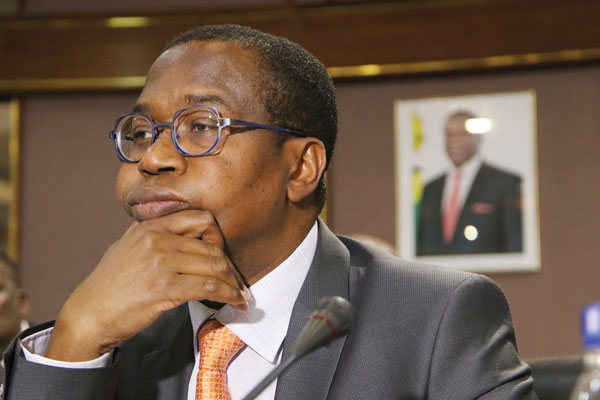
BY MIRIAM MANGWAYA/ HARRIET CHIKANDIWA/ ARNOLD FANDISO ECONOMISTS warned yesterday that the fast depreciating Zimbabwe dollar could further push up prices of basic goods and trigger fresh inflationary pressures on the economy.
The economic experts noted that these were the same factors which triggered the 2007/2008 economic meltdown, which ended with 500 billion percent inflation and the collapse of the Zimbabwe dollar.
Zimbabwe’s currency has suffered its worst battering on both the official and parallel markets in recent weeks, after the foreign exchange auction system struggled to fund allocated funds to companies.
The volatilities have also eroded consumers’ buying power, leaving most families struggling to make ends meet.
The economists spoke as the Reserve Bank of Zimbabwe (RBZ) said the currency traded at US$1:$105,6965 of the auction system on Tuesday this week, a sharp 5,8% decline from late week’s US$1:$99,9301 exchange rate on the formal market.
Parallel market rates soared to between US$1:$180 and US$1:$200, from between US$1:$160 and US$1:$170 the previous week.
CEO Africa Roundtable chairman Oswel Binha said earnings would be eroded before year end unless government takes action.
He said the auction system was on the verge of collapse.
- Chamisa under fire over US$120K donation
- Mavhunga puts DeMbare into Chibuku quarterfinals
- Pension funds bet on Cabora Bassa oilfields
- Councils defy govt fire tender directive
Keep Reading
“There is a need for some form of a rational regulation on the Zimbabwe banking system. The real market is the parallel market which is currently trading at over $200 against the US dollar. If the situation remains like this, inflation will be way on top of the roof in Zimbabwe, which will see business profitability being affected,” Binha said.
“This will erode salaries and affect disposable incomes. The continued depreciation of the Zimbabwe dollar is the manifestation of the insufficiency of the US dollar in the market.
“Another problem is that there is a phenomenon that the costs of production are pegged at the parallel market, but revenue is pegged using the official exchange rate. The discrepancy is putting pressure to initiatives to save the values of shareholders and protect their profitability.”
Economist Eddie Cross said the current state of the economy was of major concern.
“When inflation exceeds a certain reasonable level, it affects the living standards of the majority of the people,” he said.
“We have to recognise the risks and dangers involved. At the moment, I would rate inflation as our number one enemy. There is high inflation throughout the world. Now we are importing a certain amount of inflation. This is a very important issue which we need to focus on.”
Confederation of Zimbabwe Retailers president Denford Mutashu agreed that the currency decimation would result in a reduction of purchasing power.
“Prices of goods and services will increase in local currency. Unfortunately, the trend in our economy has shown that whenever there are price increases in local currency, the US dollar prices follow suit,” he said.
A survey conducted by NewsDay showed that by yesterday, prices of basic commodities had increased by between 30% and 50% in the past month.
A two-litre bottle of cooking oil, which cost $400 last month, was selling at between $600 and $650 yesterday. A 10kg bag of mealie-meal, which cost $350 last month, now costs $550.
Consumers said they were worried over the market developments.
Memory Masaire, a Chitungwiza resident, said: “My earnings have been eroded. It is becoming very hard to survive in Zimbabwe. There has been a notable increase in prices since the beginning of this month, but salaries have not increased”.
Edgar Masanga, of Sunningdale in Harare, said there was so much inconsistency in prices.
“Customers are paying higher than the actual value of commodities,” he said.
“We are at the mercy of businesspeople that are manipulating the auction rates. Some are charging higher prices in the guise of cash discounts.”
On Wednesday, Finance minister Mthuli Ncube told Parliament that it would be difficult for the RBZ to bring sanity to the foreign currency auction system in the wake of rampant arbitrage opportunities.
Ncube said a lot of work had to be done to bridge the gap between parallel market rates and the official rate.
“We have put in place several measures to eliminate (the backlog) that exists on the auctions. On Tuesday, Treasury stepped in to clear the backlog, making sure that there is certainty and credibility around the auction,” he said.
“The way we do it is not that we are handing money over to the private sector through the auction, but rather, we are exchanging the US dollar that we collect from taxes for the Zimbabwe dollar that we need to settle civil servants’ salaries and other Zimdollar needs.”
Ncube said his ministry was working to ensure that the parallel market was under control.
“We are implementing other measures going forward to make sure that we reduce the cost of speculation and dampen the arbitrage opportunities that come with that,” he said.
“We will be requesting an adjustment in the tax bands as I present the budget just to make sure that those who are at the lower levels in terms of salaries can be cushioned through a tax relief.”
Ncube added that the introduction of price controls would be disastrous.
- Follow us on Twitter @NewsDayZimbabwe











